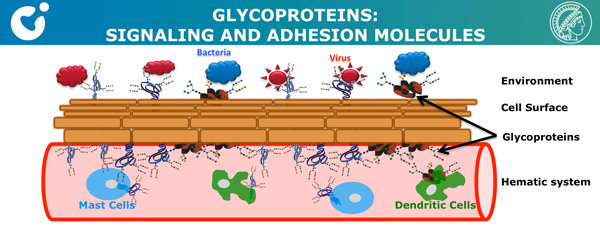
Research
Cells are frequently modifying this information in order adapt to new conditions or as a reaction on an external trigger, such an infection. These subtle adaptations also enable cells to fine tune protein functions without altering the primary function of a protein. Specific alterations of antibody glycosylation, for example, have been shown to have a significance influence on antibody dependent cell cytotoxicity (ADCC) just be altering a fucose residue on the IgG N-glycan, without actually modifying the initial specificity to the respective antigen. This information plays an important role for the production of biopharmaceutica, which themselves present a huge multibillion market. Nevertheless, there are still tremendous gaps in our basic understanding of the role of protein glycosylation, in particular in the context of disease. Within the glycoproteomics group we are in particular interested in the role of protein glycosylation in chronic inflammatory bowel diseases such as Crohn's disease and ulcerative colitis and skin cancer.
Within the glycoproteomics group we aim to uncover and determine the roles protein glycosylation plays and we aim to translate this knowledge into a medical and/or industrial context. Since glycoproteins are involved in almost uncountable interactions on the cell surface or within the extracellular matrix we essentially never have a lack in medically interesting projects.
In order to answer these questions one of our major tools is mass spectrometry. Therefore one major focus in our group is the development and application of novel and quantitative mass spectrometric tools for glycoproteomics research. These state of the art methods enable us to obtain a maximum of information from a minimum of biological sample.
Well-defined and characterised molecules are a key component in the development of novel techniques. Within the glycoproteomics group we are working closely together with the GPI-group to produce well defined and characterised glycopeptides for glycoproteomics research.
Follow @DKolarich